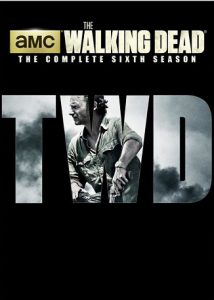In my past posts about “The Walking Dead,” I’ve analyzed how some communities stand as metaphors for forms of government – Woodbury as a fascist state, Terminus as a communist state, the Hospital as an autocratic state, and so forth. I may have jumped the gun, though, because now I think the show serves as an examination of how any modern civilized, organized society (as we know it) forms from the roots up. If modern civilization in 2016 can be boiled down to humanity’s ongoing struggle to find a balance between killing for the sake of security versus not killing because all life has value, “The Walking Dead” is a beautiful, stripped-down metaphor for this struggle.
Modern society isn’t the highest point of civilization that’s possible, of course; many sci-fi stories, for example, imagine better futures. But it is the nadir of civilization that has ever existed on Earth to this point. We haven’t yet overcome our collective belief in killing for the sake of safety, so as of 2016, the mark of an advanced society is one that farms out its killing power to its proxies in the government. This allows most of us to live in relative safety while pursuing our careers and interests while our country’s military and police state kills our perceived enemies. (Of course, it doesn’t work so smoothly in practice, but that’s another issue.)
On “The Walking Dead,” however, there aren’t countries, there are just small factions of people, such as the community of Alexandria (“our” group), whose strength is fighting; the city of Hilltop, whose strength is growing food; Negan’s mysterious group (for some reason known as the Saviors), which has a mafia-style hold on Hilltop; and Dwight’s ragtag nomadic marauders (he’s the one who killed Denise in Sunday’s episode, “Twice as Far”). While some characters have avoided killing, none of them are far removed from the reality of warfare, like most Americans are in 2016.
The thematic core of Season 6 — and perhaps the whole series — is killing and death. At first, even killing walkers was an issue: For example, Morgan is psychologically unable to kill his walker wife in the pilot episode. Now, even the most sheltered Alexandrian can kill a walker or fight in self-defense: Petrified doctor-by-necessity Denise can kill a walker, and cerebral Eugene can attack a human to escape captivity. “The Walking Dead” has moved past walkers and has climbed into the murky trenches of humans killing humans. Robert Kirkman’s show explores this on both an individual and a societal level.
Every “Walking Dead” character can be defined by their ability to kill and how they deal with it psychologically. They are all wired differently. Rick shoots first and asks questions later, and he doesn’t lose a wink of sleep at night; he has his eye on the big prize of turning Alexandria into a safe, functioning town. Carol has also been a preemptive killer the last couple seasons, but she is now haunted by her behavior and has consequently lost her ability to kill; she splits Alexandria, believing she is endangering people with her inability to kill for them. Morgan has already gone through an arc like Carol’s, and he has resolved to never kill unless in clear, one-on-one self-defense. Daryl has generally chosen not to kill unless in cut-and-dried self-defense, but he’s starting to rethink that stance after Dwight – whom he had let live in a previous episode – returned and killed Denise in “Twice as Far.” Carl killed a boy his age from Woodbury several seasons back, and it hasn’t noticeably affected him.

(It’s interesting to note that while the downfall of civilized society happened fast – see the prequel, “Fear the Walking Dead” — the characters in this fictional universe didn’t immediately devolve into killing machines. Rather, by killing walkers, they learned how to kill other humans. In that sense, the human race had to return to its most primitive roots before growing again.)
Meanwhile, as Alexandria has become a functional society, it has developed a view that reflects – on a smaller scale – global military conflicts in 2016. The Alexandrians don’t simply fortify the walls and trade peacefully – military might in exchange for food — with Hilltop. Rather, Alexandria has entered into the kind of entangled alliance that Thomas Jefferson warned about and that the modern U.S. military is engaged in. Alexandria needs food; Hilltop needs their mafia-style arrangement with the Saviors ended. Therefore, the Alexandrians raid Negan’s fortress (or, at least, one of them). They kill all of the people at that fortress with the idea that peace will now prevail in this geographic region of the post-apocalypse. This is similar to a real-world theory championed by fearmongering politicians: Wipe out the entire population of the Middle East, and then we’ll have peace.
The logistical problem with that theory is that it’s politically – and perhaps even practically — impossible to kill that many people without creating a spiral that wipes out modern civilization. The current strategy of killing a bunch of them is also problematic. Although the Bush and Obama administrations have encountered surprisingly little backlash for the staggering amount of Middle Eastern civilians they’ve killed with drone bombs, that bombing campaign has likewise only exacerbated and prolonged the conflict; some terrorists have been killed, but more enemies have been created.
Alexandria will soon find itself in this same nightmare loop when it is revealed that many more Saviors exist. (This was hinted at in “The Same Boat” when the “last” member of Negan’s group proclaims that “We’re all Negan” before Rick murders him. Meanwhile, casting of Negan – Jeffrey Dean Morgan – has been openly reported, so we know the Alexandria vs. Savior war is far from over.) From the Saviors’ point of view, they held a Hilltopper and the Alexandrians killed a few Saviors in order to rescue that Hilltopper – at which point the two sides were even. But then the Alexandrians went on to kill EVERYONE in the fortress, under the theory of pre-emptive self-defense that is ubiquitous in real-world warfare.
Negan’s group is the bad guys from Alexandria’s perspective, and vice versa, and both sides have a reasonable case.
“The Walking Dead’s” spiral of killing brings us back to the individual side of things. Caught up in this war, people who aren’t wired to kill have had to do so – memorably, in “Not Tomorrow Yet,” Glenn openly weeps as he kills a Savior in his sleep during the silent raid. Mostly by good fortune, Glenn hadn’t had to kill a human up until that point; he is weeping for the loss of part of his humanity, or perhaps for the end of the last vestiges of the (by comparison) peaceful pre-apocalyptic world.
Ironically, Glenn’s newfound ability to kill might buy him more time on “The Walking Dead.” It’s often theorized on “Talking Dead” that characters with the healthiest moral and ethical perspectives tend to be killed off. In “Twice as Far,” Denise is killed by Dwight’s arrow (intended for Daryl) just as she’s winding down a speech to Daryl and Rosita about how they are missing the point of life: It’s not about avoiding dying, it’s about living and taking risks. Previously, we’ve seen the deaths of “moral centers” such as Dale, Hershel and Beth – not to mention one-episode-wonder Eastman, who was Morgan’s Yoda. The deceased characters often live on in those they leave behind: Dale mentored Glenn, Hershel was the loving father of Maggie and Beth, and Beth’s sweetness touched the whole group. Like Noah and Denise, Beth is also a haunting symbol of missed possibilities.
That having been said, those who are better at killing survive longer on “The Walking Dead.” In a nutshell, that’s why while society becomes more statistically peaceful as time goes by (today’s wars and military actions are horrendous, but they feature many fewer deaths than wars of a mere half-century ago), it progresses in fits and starts. Under that theory, Carol and Morgan are extremely vulnerable right now. Morgan might have made a lasting impression on Rick in “Twice as Far” when he completes construction of a jail cell in Alexandria. He built the cell so Rick will have another option the next time he has to stop an enemy. Rick literally scoffs at the notion, but the idea of that jail cell – and of the way things used to be, before the apocalypse — is firmly planted in his mind now. As such, Morgan’s belief might outlive him: “Where there’s life, there’s possibility.”
And in the real world, where that belief is expressed, no matter how timidly and no matter how much it is drowned out by fearmongers, civilization inches forward.

